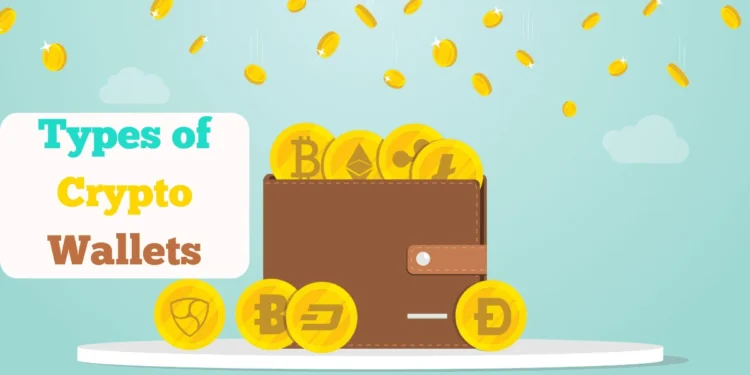Contents
Introduction
Entering the world of cryptocurrency can be both exciting and overwhelming, especially when it comes to managing your digital assets. Central to this experience is the use of cryptocurrency wallets, digital tools that enable you to store, send, and receive your crypto securely. In this guide, we will explore the different types of Cryptocurrency Wallets, understand their features, and learn how to choose the right wallet for your needs.
Recommended: What is a Crypto Wallet? How does it keep your Digital Currency?
Types of Cryptocurrency Wallets
Hardware Wallets
Introduction to Hardware Wallets
When it comes to keeping your cryptocurrencies safe, hardware wallets stand out as robust and secure solutions. These physical devices, resembling USB drives, are specifically designed to store private keys offline, away from potential online threats. Let’s delve into the world of hardware wallets and understand why they are a popular choice among crypto enthusiasts.
Examples of Popular Hardware Wallets
- Nano Ledger S: Known for its compact design and ease of use, the Nano Ledger S is a hardware wallet that supports a variety of cryptocurrencies.
- Trezor Model T: Trezor’s Model T is another leading option, offering a touchscreen interface and advanced security features.
- KeepKey: With a sleek design, KeepKey emphasizes simplicity while providing a secure environment for storing your digital assets.
Using Hardware Wallets for Safe Storage
For beginners, the process of setting up and using a hardware wallet may seem daunting at first, but the extra layer of security it provides is well worth the effort. Most hardware wallets come with user-friendly interfaces and step-by-step setup guides. Once set up, you can enjoy the peace of mind that comes with knowing your private keys are stored in a secure, offline environment.
Software Wallets
Overview of Software Wallets
Unlike hardware wallets, software wallets exist in the digital realm, making them accessible through various devices such as computers, smartphones, and tablets. They come in different forms, catering to users with different preferences and needs.
Different Types of Software Wallets
Desktop Wallets:
- Electrum: Known for its simplicity and security, Electrum is a desktop wallet that’s easy to set up and use.
- Exodus: With a user-friendly interface, Exodus supports a wide range of cryptocurrencies and provides a built-in exchange feature.
Mobile Wallets:
- Trust Wallet: Designed with simplicity in mind, Trust Wallet is a mobile wallet popular for its ease of use and support for a vast array of tokens.
- Atomic Wallet: Offering both desktop and mobile versions, Atomic Wallet stands out for its decentralized atomic swap capabilities.
Online Wallets:
- Blockchain.info: As a web wallet, Blockchain.info provides users with a straightforward online solution for managing their cryptocurrencies.
- GreenAddress: Focused on security and privacy, GreenAddress is an online wallet that emphasizes user control over funds.
Pros and Cons of Software Wallets
Software wallets are favored for their convenience and accessibility, allowing users to manage their crypto on the go. However, being connected to the internet poses certain security considerations. Beginners must weigh the pros and cons before deciding which software wallet aligns with their preferences.
Mobile Wallets
Introduction to Mobile Wallets
For those who prefer the convenience of managing their cryptocurrencies from their smartphones, mobile wallets offer a practical solution. These wallets are designed for both iOS and Android users, providing flexibility and accessibility.
Notable iOS Cryptocurrency Wallets
- Coinomi: A user-friendly wallet supporting multiple cryptocurrencies, Coinomi is known for its simplicity and robust security features.
- Bread (BRD) Wallet: Tailored for beginners, Bread Wallet provides a straightforward mobile experience for managing digital assets on iOS devices.
Android Cryptocurrency Wallets
- MyEtherWallet (MEW): While primarily known for Ethereum, MEW supports a variety of ERC-20 tokens, making it a versatile choice for Android users.
- Coinomi: With its intuitive interface, Coinomi is a popular choice among Android users, offering support for a broad range of cryptocurrencies.
Web Wallets
Explanation of Web Wallets
Web wallets, also known as online wallets, operate through web browsers, providing users with a convenient way to access their cryptocurrency holdings from any device with an internet connection. They offer a balance between accessibility and security.
Browser-Based Wallets
MetaMask:
- Known for its compatibility with decentralized applications (DApps), MetaMask is a browser extension wallet that simplifies interaction with the Ethereum blockchain.
MyEtherWallet (MEW):
- MEW, in addition to its mobile version, also functions as a browser-based wallet, allowing users to manage their Ethereum and ERC-20 tokens securely.
Exchange Wallets with Web Access
Binance Wallet:
- As an extension of the Binance exchange, the Binance Wallet provides users with easy access to their funds for trading and withdrawal purposes.
Coinbase Wallet:
- Coinbase offers a user-friendly web wallet that integrates with its exchange platform, allowing users to manage their cryptocurrencies seamlessly.
Guidance on Safely Using Web Wallets
While web wallets offer accessibility, it’s crucial to prioritize security. Utilize two-factor authentication, choose strong passwords, and be cautious of phishing attempts. Only use reputable web wallets and ensure that the platform employs robust security measures.
Paper Wallets
Introduction to Paper Wallets
For users seeking an extra layer of security through offline storage, paper wallets provide a straightforward solution. A paper wallet typically includes a public address for receiving funds and a private key for spending or transferring funds.
Generating a Paper Wallet:
- To generate a paper wallet, use a reputable service like WalletGenerator.net, following the provided instructions to create and print your wallet.
Securing Your Paper Wallet:
- Safeguard your paper wallet by keeping it in a secure physical location, such as a safe or lockbox. Avoid sharing your private key and consider laminating the paper for added durability.
Multi-Signature Wallets
Beginner-Friendly Explanation of Multi-Signature Wallets
Multi-signature wallets, often referred to as multisig wallets, enhance security by requiring multiple private keys to authorize a transaction. This additional layer of protection makes multisig wallets a popular choice for users seeking heightened security measures.
Benefits of Using Multi-Signature Wallets
Increased Security:
- With multiple keys needed to authorize transactions, the risk of unauthorized access is significantly reduced.
Protection Against Single Points of Failure:
- In the event of a compromised key or device, the presence of additional signatures adds an extra layer of defense.
Examples of Multi-Signature Wallet Providers
Copay:
- Copay is a user-friendly multi-sig wallet that allows users to set up shared wallets for collaborative control.
BitGo:
- BitGo provides institutional-grade multisig wallets, emphasizing security for businesses and high-net-worth individuals.
Deterministic Wallets
Introduction to Deterministic Wallets
Deterministic wallets are designed to generate a sequence of keys from a single seed, making it easier for users to create and recover their wallets. This approach simplifies the backup process while maintaining security.
How Deterministic Wallets Work:
- Deterministic wallets generate a unique seed phrase that serves as the root for generating a sequence of keys. This simplifies the backup and recovery process.
Advantages of HD Wallets:
- HD wallets, such as Ledger and Trezor, provide a hierarchical structure, allowing users to generate an unlimited number of addresses from a single seed.
Choosing the Right Cryptocurrency Wallet
Choosing the right cryptocurrency wallet is a crucial decision that depends on your preferences, needs, and security considerations. Here are some simplified factors to consider:
User-Friendliness:
- Opt for a wallet with an intuitive interface, especially if you’re new to cryptocurrencies.
- Consider wallets like Trust Wallet and MetaMask for their user-friendly design.
Security Features:
- Prioritize wallets with robust security features, such as two-factor authentication and encryption.
- Hardware wallets like Ledger and Trezor offer excellent security for storing your private keys offline.
Device Compatibility:
- Ensure the wallet is compatible with the devices you regularly use, whether it’s a desktop, mobile, or web browser.
- Wallets like Coinomi and Exodus provide multi-platform support for added convenience.
Supported Cryptocurrencies:
- Check which cryptocurrencies the wallet supports to ensure compatibility with your digital assets.
- Consider wallets like MyEtherWallet for Ethereum and its ERC-20 tokens or Coinomi for a diverse range of cryptocurrencies.
Backup and Recovery Options:
- Look for wallets that provide clear instructions on backup and recovery processes.
- Hardware wallets often come with a recovery seed phrase, simplifying the process of restoring your wallet if needed.
Security Features in Cryptocurrency Wallets
Ensuring the security of your cryptocurrency holdings is paramount. Here are key security features to be aware of:
Two-Factor Authentication (2FA):
- Enable 2FA whenever possible to add an extra layer of security to your wallet.
- Popular wallets like Binance and Coinbase offer 2FA options for account protection.
Encryption Methods:
- Understand the encryption methods employed by your chosen wallet to safeguard your private keys.
- Trustworthy wallets use advanced encryption algorithms to protect your digital assets.
Seed Phrases:
- Seed phrases are crucial for wallet recovery. Store your seed phrase securely, preferably offline.
- Hardware wallets and some software wallets like MyEtherWallet use seed phrases for recovery.
Biometric Authentication:
- Some mobile wallets offer biometric authentication (fingerprint or facial recognition) for added security.
- Trust Wallet, for example, provides biometric options for Android and iOS users.
Conclusion
Congratulations! You’ve navigated the diverse world of different types of cryptocurrency wallets and are now equipped with the knowledge to make informed decisions. As a beginner, understanding different types of cryptocurrency wallets and their features is a crucial step in securing your digital assets. Remember, the right wallet for you depends on your preferences, needs, and the level of security you seek.













